I’m going to demonstrate keyword research in 2023 to you in detail today. In this guide, I’ll go over:
- Identifying keywords
- How to select appropriate keywords
- How to use common tools for keyword research
- Advanced advice for keyword research and many more
Therefore you’ll enjoy this tutorial if you desire more traffic and higher Google rankings.
Let’s get going…
Chapter1: Keyword Research
I’ll go over the basics of keyword research in this chapter. You will first gain a clear understanding of what keyword research is (and why it is crucial for SEO).
What is Keyword Research?
When you look for something on the internet using Google, Bing, or YouTube, you type in words or phrases. Keyword research is the process of figuring out which words or phrases people are typing in so that website owners can use them to make their websites more visible and helpful to those searching for something online.
Why is Keyword Research Important For SEO?
Finding content subjects, on-page SEO, email outreach, and content promotion are all impacted by the keyword research you do. Because of this, any SEO campaign’s first step is typically keyword research.
In other words:
For your SEO campaigns, keywords serve as a compass that shows you where to go and whether you’re making progress. Also, doing keyword research can assist you to comprehend your target market. That’s because keyword research provides information on the precise words and phrases that buyers use when searching.
In other words, keyword research is modern market research.
Chapter2: How To Find Ideas For Keywords
Well, let’s continue our discussion on keyword research. To increase the visibility of our material to internet users performing searches, we need to compile a list of words and phrases.
I’m going to give you some advice today on how to generate a wide variety of keywords.
Let’s start now.
Brainstorm a List of Topics
This is where you think of subjects that would interest your target audience.
Let’s use the example of running a digital marketing agency. You might therefore consider asking yourself: “What subjects do people look up to that are associated with my business?”
Several subjects come to mind, including the following:
- The Internet
- Email advertising
- Traffic to websites Content marketing
- Blogging
- PPC
But The following subjects are not keywords (yet). Which is precisely what you’ll be taught how to accomplish right now.
Wikipedia Table of Contents
Did you know that Wikipedia can be really helpful for finding keywords? This website has articles written by thousands of professionals in different industries and they are all categorized neatly. So, if you want to find keyword suggestions, you can start by going to Wikipedia and entering a general term related to your topic. Once you find the relevant article, look for the “contents” section.

This part will list the subtopics mentioned in the article, some of which might have great keywords that are hard to find elsewhere. You can also check out the Table of Contents of other related articles by clicking on the internal links on the page. Give it a try.
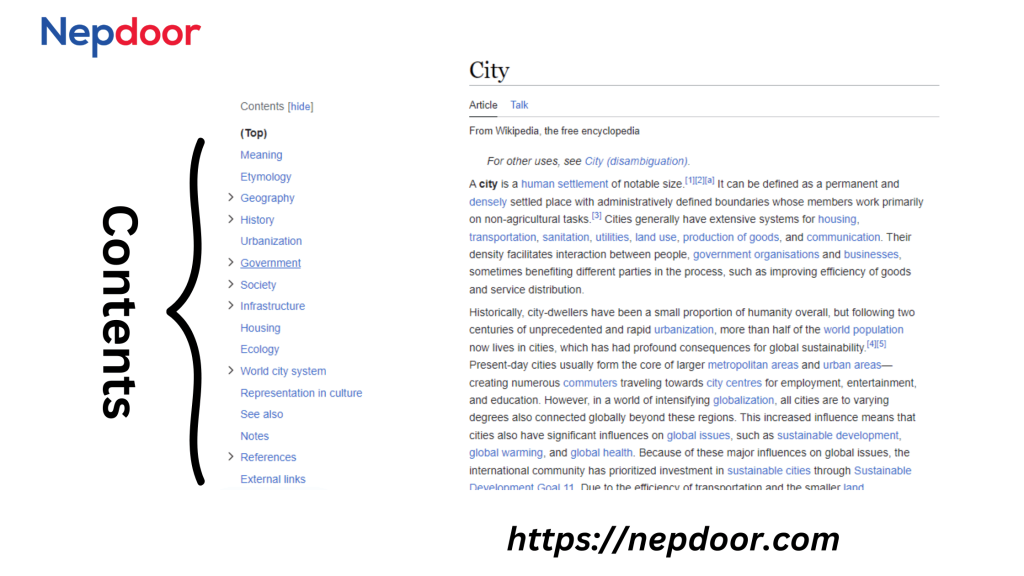
Searches Related To
Checking out the “Searches Similar to” box at the bottom of Google’s search results is another fascinating technique to identify keywords. Let’s imagine, for illustration, that “digital marketing” was one of your subjects. You should use Google to conduct a keyword search for that phrase.
Get to the page’s bottom by scrolling. 8 keywords that are closely linked to your search query are listed below.

These are keyword suggestions that come directly from Google, similar to Google Suggest. You can therefore avoid speculating about their popularity. You are being told by Google that “hundreds of people look for these phrases.”
Use Google and YouTube Suggest
Once you’ve created a list of ideas, enter each one into Google. See what terms Google suggests to you as well. You should include these words in your list of keywords.
Why?
Because you KNOW that many people are searching for a keyword if Google suggests it. You need not, however, stop at Google Suggest.

With YouTube Suggest, you may also obtain keyword suggestions:
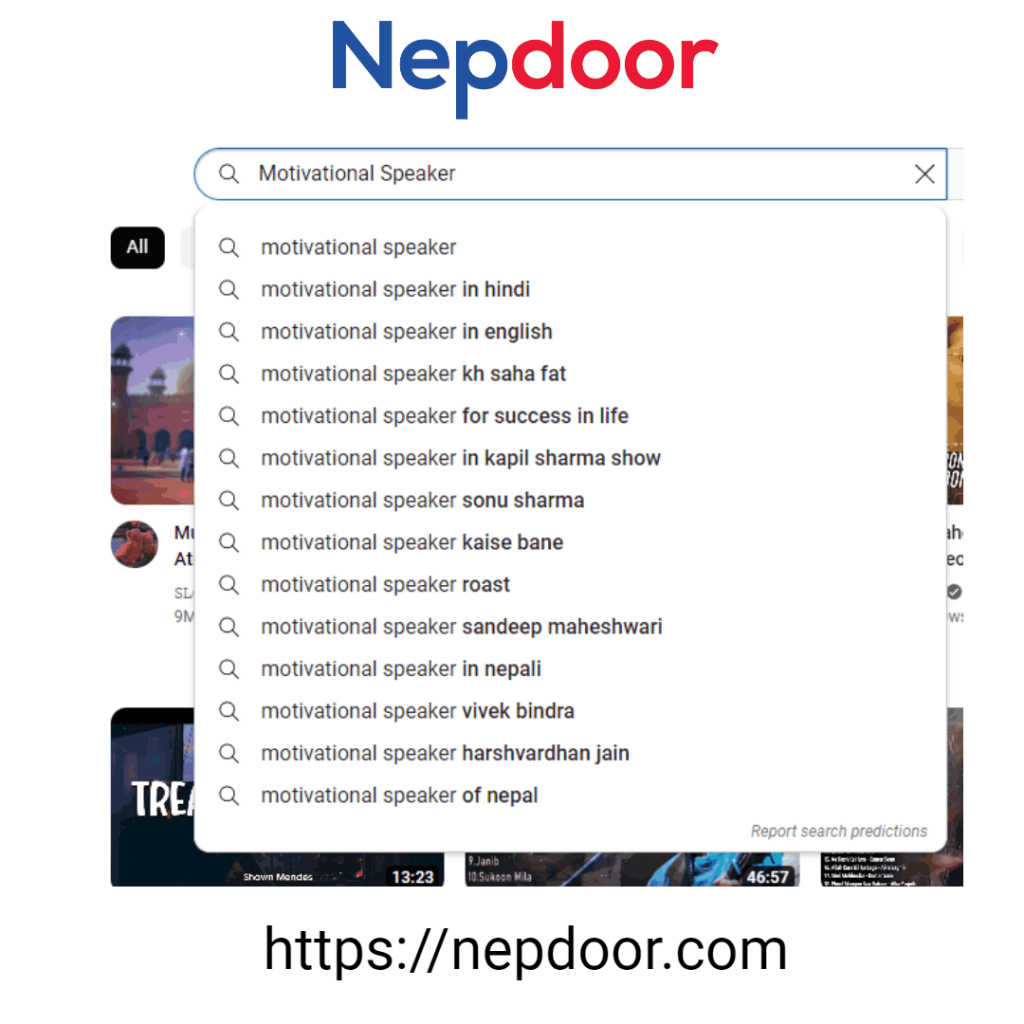
Chapter3:Keyword Research Tools
The focus of this chapter is on tools. Do you need a tool to find keywords? Yet, a tool significantly streamlines the procedure. These are some tools for keyword research that I use and suggest.
The Keyword Planner Tool
The most trustworthy online resource for keyword information is Google’s Keyword Planner. Since the Keyword Planner comes directly from Google, unlike most other tools, the data you obtain from the Keyword Planner comes directly from Google.
(So you can be sure they are true)
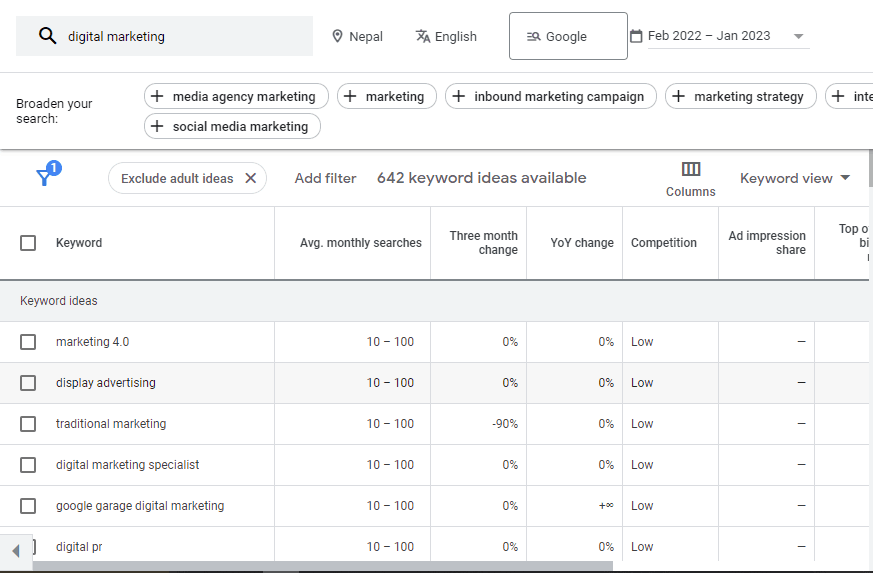
The GKP’s primary drawback is that it’s intended to assist users with their Google ad campaigns, not with SEO. Despite this, you may still utilize the GKP to uncover popular search terms and generate lists of keyword suggestions.
Keyword Surfer
I think my favorite keyword research tool is Keyword Surfer because it displays keyword suggestions gleaned from Google’s search results.
Installing the Chrome extension is all that is necessary. And the next time you conduct a Google search, you’ll receive a list of potential keywords along with information on each one.
Ubersuggest
The first Google-Suggested scraper I used was Ubersuggest. And the tool just underwent a significant revamp and upgrade.
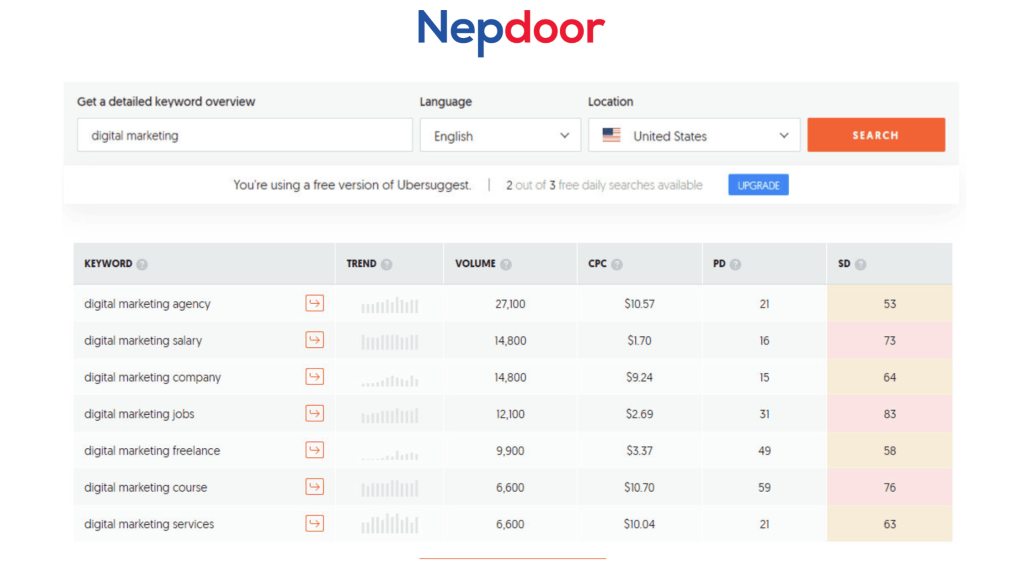
Google’s search suggestions are still a source of term ideas for Ubersuggest. But it also provides information on each keyword (like search volume, CPC, keyword difficulty, and more).
SEMrush
I STRONGLY advise SEMrush if you wish to invest in a paid keyword tool. This is due to how much time SEMrush can save.
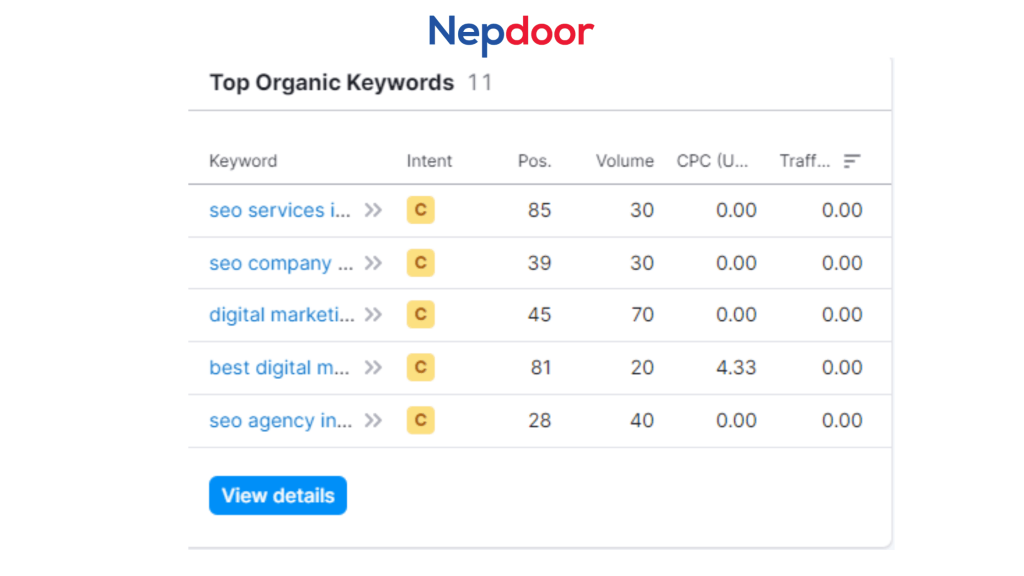
This is why SEMrush gives you the precise keywords a site already ranks for rather than letting you enter random keywords into a tool. Thus, enter any website you compete with on Google into SEMrush.
Ahrefs
Many people think of Ahrefs when they think about link-building, however, other people might not be aware that Ahrefs also includes a very potent keyword tool. The “Keyword Explorer” feature of Ahrefs is a useful tool that offers a plethora of data for each term you search. It might assist you in deciding whether or not a keyword is worthwhile to pursue.
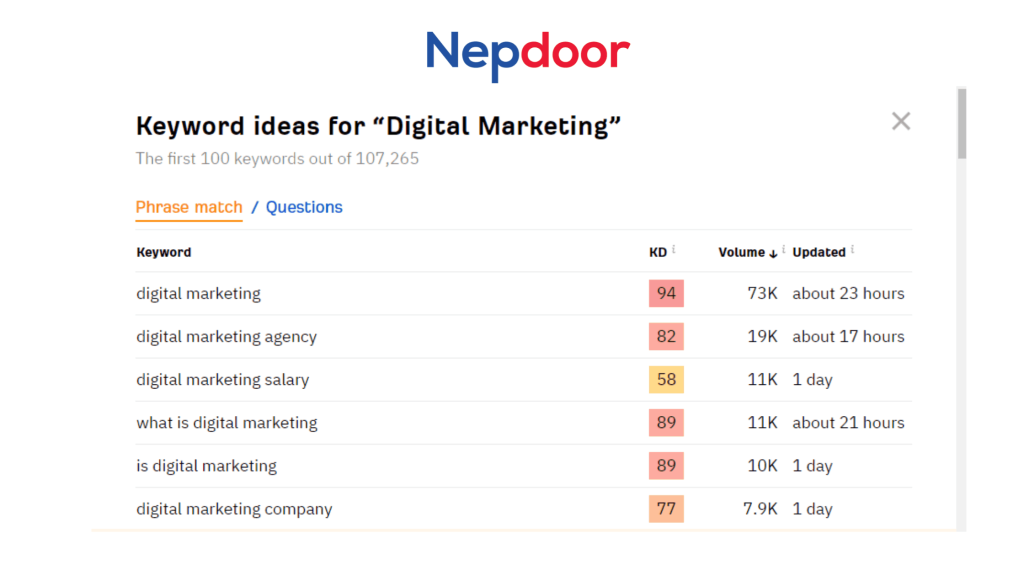
The tool struggles to come up with novel keyword suggestions, which is a drawback. It frequently provides variations of the first keyword you typed. Although this is the case, Ahrefs Keyword Explorer provides some of the greatest options for focusing your search on a single term.
Chapter4: Keyword Difficulty
How do you determine whether a keyword is too difficult to rank for?
It’s a wise inquiry to make. So you can have problems moving past Google’s third page if you select a competitive keyword. However, you stand a fair chance of ranking in the top 3 if you can pick a term with little opposition.
Here is a formula for calculating a keyword’s SEO difficulty.
Long Tails Keywords are Less Competitive
If your website is a new one. Or if you want to concentrate solely on less competitive keywords. Then, targeting long-tail keywords is a MUST. I’ll clarify.
The majority of SEO professionals, including myself, classify keywords into three primary groups: the head, body, and long tail.
Here is an explanation of each sort of keyword:
Term Heads
These are typically short, competitive keywords with high search traffic. Head phrases include words like “insurance” or “vitamins,” for instance. Head Keywords typically don’t convert well since searcher intent varies widely (a person searching for “insurance” might be looking for a vehicle insurance quote, a list of life insurance firms, or a definition of the word).
Body Phrases
Body keywords are shorter, more precise versions of head keywords that receive a reasonable amount of monthly searches (at least 2,000). Body Keywords include phrases like “purchase vitamins online” or “buy life insurance.” Compared to Head Terms, these nearly always face less competition.
Keywords with long tails
Long tail keywords are lengthy, four-word, or longer phrases that are typically quite specific. Long tail keywords include expressions like “cheap life insurance for seniors” and “buy vitamin D pills online.” Individually, there aren’t many searches for each of these terms (usually around 10-200 searches per month). The bulk of online searches, though, have long tails when you add them all up. Long tail keywords typically aren’t particularly competitive because there aren’t many searches for them.
Authority of Sites on Google’s First Page
Here’s an easy method to gauge how competitive a keyword is.
Do a Google search for your keyword first. Next, take a look at the websites that are listed first.
(Not specific pages)
You might wish to remove that keyword from your list if the top page is dominated by uber-authority sites (such as Wikipedia). But, if you notice a few more niche sites on page 1, then that means you may also rank there.
Chapter5: How to Choose a Keyword
How do you choose a keyword from your list of options now? There isn’t a program that will tell you, “This is the best keyword on your list,” sadly.
Instead, you must evaluate each keyword in light of many different aspects. Then, choose the term that is most appropriate for your company.
As you may anticipate, I’m going to teach you how to do it in this chapter.
Search Volume
It’s really simple. You can acquire more traffic from a term the more people search for it.
The inquiry is:
A “good” search volume is what?
Short response: Depends. The detailed reply. The amount of searches varies greatly amongst industries.
Organic Click Through Rate
You can get the solution without clicking anything thanks to the featured snippets.
Moreover, Google now includes more adverts than ever before in the search results:
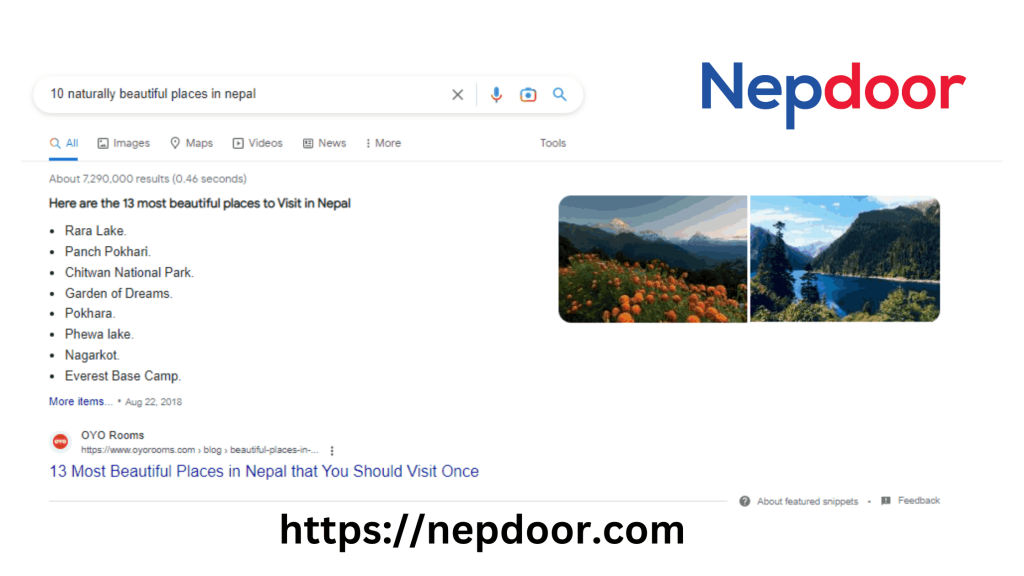
It is widely known that fewer Google users are choosing to click on organic search results.
Only a portion of the tale is revealed by the search volume. You also need to estimate organic CTR to obtain a complete idea of how many clicks you’ll receive from a first-page Google ranking.
Cost Per Click
Cost per click, or CPC, is a single measure that provides a significant response.
Do those who look for this keyword make any purchases? So, search volume is okay.
Yet there is little purpose in focusing on a keyword if it has no commercial intent. Also, if the CPC is high enough, you can occasionally receive a tremendous ROI from a keyword that doesn’t generate a lot of searches.
Keywords Trends
Next, you should ascertain whether your keyword is growing or shrinking slowly. which action will have the greatest impact? Google Trends
I was analyzing the term “digital marketing” as an example.
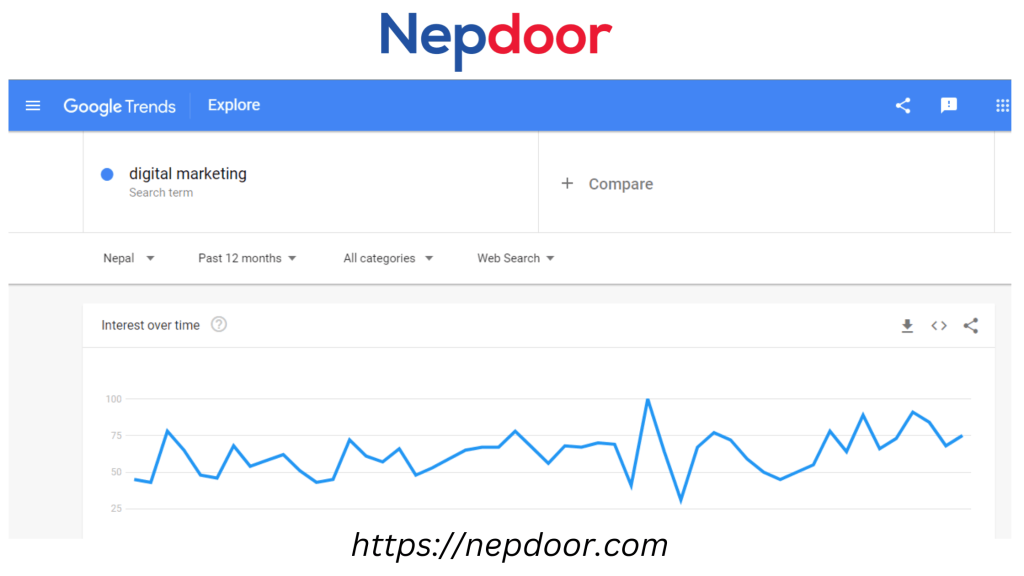
Chapter6: Advanced SEO Strategies
After mastering the fundamentals of keyword research, it’s time to discuss some fun advanced topics. I’m going to share several quick-to-implement tactical keyword research tips with you in particular.
So let’s get right to the advice without further ado.
Barnacle SEO
Let’s say you discovered the PERFECT keyword. And for that word, you are among the top 3. You’re almost done, right? Truth be said, not really. It turns out that Barnacle SEO can help you obtain even MORE traffic from that term.
Barnacle SEO is the tactic of exploiting the authority of existing websites to rank highly.
Optimize Content around Synonyms and Related Keywords
Indeed, you should center your page’s optimization around your primary keyword.
Don’t stop there though. By basing the content of your page on synonyms and closely similar terms, you can increase the amount of search engine traffic that it receives.
Ahrefs Content Gap
One of my favorite Ahrefs features is now Content Gap. You may use Ahrefs to examine the precise keywords that another website ranks for, just like with SEMRush. You may advance this kind of competitive keyword analysis with Ahrefs Content Gap as well.
Analyze Keywords based on Searcher Intent
For an SEO strategy to be successful, it is essential to analyze terms based on searcher intent. The likelihood that your content will rank better in search results increases if you are aware of why people are using a given keyword in their searches.
Do You Want More Traffic To Your Websites? Click Here and get 15 min Free Consultation.
While selecting your keywords, keep in mind to take into account both relevance and the searcher’s intent, and make content that supports that aim.
Find Shoulder Keywords
Most website owners Exclusively focus their optimization efforts on keywords that are relevant to their products. And it’s a MAIN error for two reasons in particular:
- The competition for product keywords is typically fierce.
- Your potential consumer searches for thousands of other keywords when they aren’t specifically looking for what you sell.
Also, your consumer is far more likely to make a purchase from you in the future if you can get in front of them with some fantastic content.
It’s Your Time Now
Hope you liked my new keyword research guide. And now I want to hear from you.
Which advice from the present article are you planning to try first?
- You’re going to give Shoulder Keywords a try, right?
- Another option is to focus your optimization efforts on popular keywords.
In either case, please let me know by posting a brief comment below.





Comments